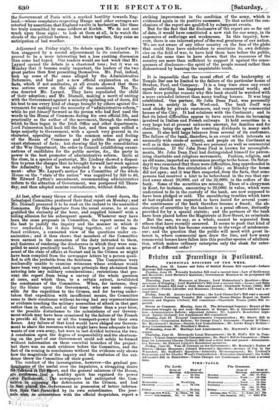Mr. Disraeli procured it to be read on the instant
to the assembled Sebastopol Committee produced their final report on Monday ; and At last, after many throes of discussion with closed doors, the
Commons. By this departure from the usual course, he at once gratified the curiosity of the hour, and supplied himself with a telling allusion for his subsequent speech. Whatever may have been the cross proposals in Committee, the report seems to do the beat to justify the inquiry and ihe manner in which it was conducted ; for it does bring together, out of the con- fused evidence, a connected view of the questions under ex- amination; and it thus shows that members of the Committee were earnest in the execution of the duty intrusted to them, and desirous of rendering the disclosures in which they were eom- pelled to assist practically useful. The report is just such an ac- count of the state of affairs at Scutari and in the Crimea as might have been compiled from the newspaper letters by a person quali- fied to sift the probable from the fictitious. The Committee were confessedly unable to examine witnesses whose evidence would have been very important, and upon principle they abstained from entering into any military considerations ; restrictions that pre- vent the report from being a survey of the whole question at issue, and which thus, to a certain extent, invalidated the conclusions of the Committee. When, for instance, they lay the blame upon the Government, who are made respon- sible for the expedition to the Crimea, and for having under- taken that expedition with insufficient means, the Committee come to their conclusion without having had any representations lir evidence touching the military necessities of attack in that part rather than in others, and at that time rather than a year later, or the possible disturbance to the calculations of our Govern- ment whieh may have been occasioned by the failure of the French to provide all the men or all the transport-power for their own forces. Any failure of that kind would have obliged our Govern- ment to share-the resources which might have been adequate to the wants of our own army, but were in tact divided between the two. A conclusion upon the degree of responsibility and the shortcom- ing on the part of our Government could not safely be formed without information on these essential branches of the project : but there was no such evidence before the Committee, and the fact of its coming to conclusions without the evidence only shows how the magnitude of the inquiry and the confusion of the evi- dence threw the Committee oil their guard.
The conduct of the investigation, however—the gradual pre- of the useful over the impulsive, a struggling desire alb 11(641itort, and the general calmness of the House, healthy spirit has regained its power e newspapers had anticipated the Com- TRIVei-‘14, .woopt deficiencies in the Crimea, and had -pliteell'.the,Go ernment in possession of better informs- Vet _Wait that Jdr3 is d by its own subordinates. The jour- rseAtonewri ce with the official despatches, report a
striking improvement in the condition of the army, which is evidenced again in its positive successes. To that extent the con- clusions of the report are qualified by subsequent events. But for the fact that the disclosures of the report are so far out of date, it would have constituted a new risk for our army, in its exposures of sufferings and weaknesses. In this inquiry, how- ever, there is one inherent proof of the real greatness of our nation. We are not aware of any other country on the face of the globe that could thus have undertaken to scrutinize its own deficien- cies on the field of war, to have laid them bare before the public, and at the same time to have shown that the resources of the country are more than sufficient to support it against the conse- quences of disclosure—the spirit of the people roused rather than disheartened by learning the unpalatable truth. -


































 Previous page
Previous page